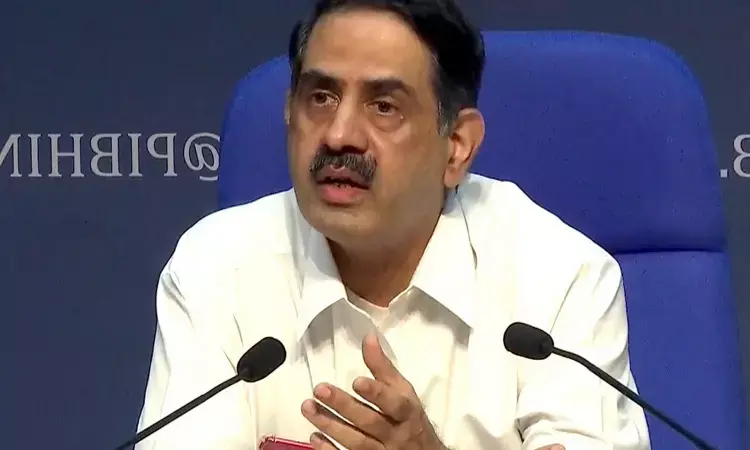- Home
- Medical news & Guidelines
- Anesthesiology
- Cardiology and CTVS
- Critical Care
- Dentistry
- Dermatology
- Diabetes and Endocrinology
- ENT
- Gastroenterology
- Medicine
- Nephrology
- Neurology
- Obstretics-Gynaecology
- Oncology
- Ophthalmology
- Orthopaedics
- Pediatrics-Neonatology
- Psychiatry
- Pulmonology
- Radiology
- Surgery
- Urology
- Laboratory Medicine
- Diet
- Nursing
- Paramedical
- Physiotherapy
- Health news
- Fact Check
- Bone Health Fact Check
- Brain Health Fact Check
- Cancer Related Fact Check
- Child Care Fact Check
- Dental and oral health fact check
- Diabetes and metabolic health fact check
- Diet and Nutrition Fact Check
- Eye and ENT Care Fact Check
- Fitness fact check
- Gut health fact check
- Heart health fact check
- Kidney health fact check
- Medical education fact check
- Men's health fact check
- Respiratory fact check
- Skin and hair care fact check
- Vaccine and Immunization fact check
- Women's health fact check
- AYUSH
- State News
- Andaman and Nicobar Islands
- Andhra Pradesh
- Arunachal Pradesh
- Assam
- Bihar
- Chandigarh
- Chattisgarh
- Dadra and Nagar Haveli
- Daman and Diu
- Delhi
- Goa
- Gujarat
- Haryana
- Himachal Pradesh
- Jammu & Kashmir
- Jharkhand
- Karnataka
- Kerala
- Ladakh
- Lakshadweep
- Madhya Pradesh
- Maharashtra
- Manipur
- Meghalaya
- Mizoram
- Nagaland
- Odisha
- Puducherry
- Punjab
- Rajasthan
- Sikkim
- Tamil Nadu
- Telangana
- Tripura
- Uttar Pradesh
- Uttrakhand
- West Bengal
- Medical Education
- Industry
ICMR unveils MUDRA Toolbox for dementia in five Indian languages

MUDRA Toolbox is an initiative undertaken by ICMR Neuro-Cognitive Tool Box (ICMR-NCTB) consortium to transform India's dementia and mild cognitive impairment research and clinical practices.
New Delhi: The Indian Council of Medical Research (ICMR) on Wednesday released the Multilingual Dementia Research and Assessment (MUDRA) Toolbox in five Indian languages - Hindi, Bengali, Telugu, Kannada and Malayalam.
"The validated MUDRA Toolbox is available now in various Indian languages Hindi, Bengali, Telugu, Kannada and Malayalam. This was one of the crucial needs for undertaking uniform, standardized dementia research in the country," Dr Balram Bhargava, Director General of ICMR said in an official statement.
He further informed that the toolbox includes various cognitive tests to assess different domains of cognition such as attention and executive function, memory, language, and visuospatial functions.
Prof Jeyaraj D Pandian, Principal, Christian Medical College Ludhiana, said MUDRA Toolbox is a comprehensive tool specifically to diagnose dementia in the Indian population.
"The investigators had worked very hard over the last six years to develop and validate the tool in the Indian population," Dr Pandian said.
Dr R S Dhaliwal, Head-NCD said that it is a unique tool consisting of various tests and questionnaires and is sensitive to the factors that affect performance on cognitive tests including education, language and culture.
"ICMR commissioned a multi-disciplinary project with a team of researchers from various fields including neurologists, psychologists, and speech-language pathologists to develop a culturally, educationally and linguistically relevant neurocognitive toolbox," Dhaliwal added.
MUDRA Toolbox is an initiative undertaken by ICMR Neuro-Cognitive Tool Box (ICMR-NCTB) consortium to transform India's dementia and mild cognitive impairment research and clinical practices.
It is a collective effort by seven leading centres in India NIMHANS (Bengaluru), AIIMS (New Delhi), SCTIMST (Thiruvananthapuram), NIMS (Hyderabad), Apollo Hospital (Kolkata), Manipal Hospital (Bengaluru) and Jawaharlal Nehru Medical College.
According to the Dementia India Report 2010 by Alzheimer's and Related Disorders Society of India (ARDSI), there are approximately 5.29 million people living with dementia in India and this number is expected to increase to 7.61 million by 2030.
Despite the high number of people with dementia in the country, only one in ten people with dementia are diagnosed in India due to low awareness and the lack of linguistically and culturally appropriate tests that are essential for diagnosis.
Dementia is a neurological disorder that causes a decline in a person's cognition and affects their ability to carry on with day-to-day activities.
Also Read:Healthcare workers on COVID- 19 duty need psychosocial intervention, points IJMR study
Medical Dialogues Bureau consists of a team of passionate medical/scientific writers, led by doctors and healthcare researchers. Our team efforts to bring you updated and timely news about the important happenings of the medical and healthcare sector. Our editorial team can be reached at editorial@medicaldialogues.in.


